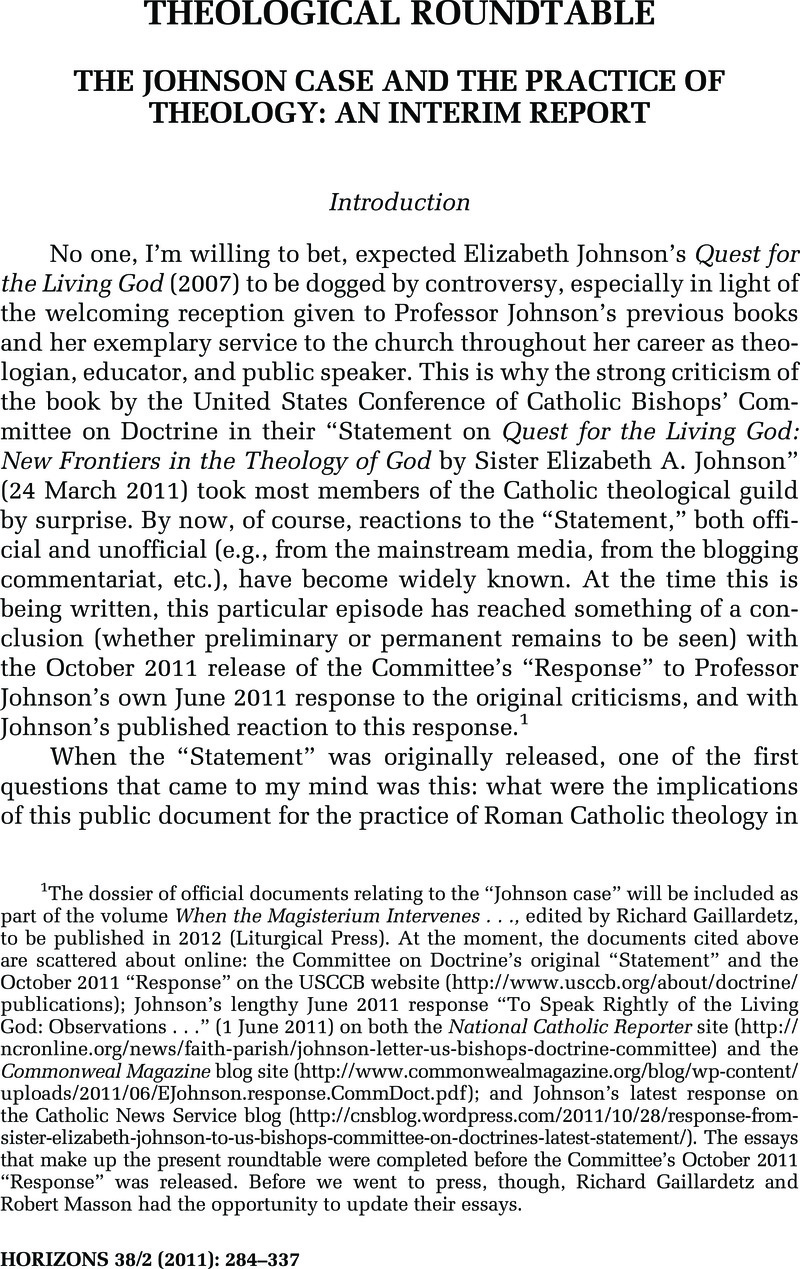Article contents
The Johnson Case and the Practice of Theology: An Interim Report – IV
Published online by Cambridge University Press: 10 January 2013
Abstract

- Type
- Theological Roundtable
- Information
- Copyright
- Copyright © The College Theology Society 2011
References
1 Rush, Ormond, The Eyes of Faith: The Sense of the Faithful and the Church's Reception of Revelation (Washington, DC: Catholic University of America Press, 2009)Google Scholar, especially Part Three.
2 Newman seems to locate the priestly function of the church in the ministry of the priest and the laity in the parish community, the prophetic function in the schola theologorum, and the governing function in the ministry of the bishops. See Newman, John Henry, Via Media of the Anglican Church [1877], ed. Weidner, H. D. (New York: Oxford University Press, 1990), I: xlGoogle Scholar. See also idem, An Essay on the Development of Christian Doctrine. 6th ed; (Notre Dame, IN: University of Notre Dame Press, 1989), II, 2, 76–77.
3 Rush, 175.
4 See Lumen gentium 12.
5 In fact, there is some question regarding whether we should consider a statement of the conference's Committee on Doctrine as properly a magisterial statement. Pope John Paul II's apostolic letter Apostolos suos granted a doctrinal teaching authority to documents issued by an episcopal conference in either of two situations: 1) the document is approved unanimously by the entire conference or, 2) the document is approved by a 2/3 majority and receives a recognitio from the Holy See. This raises a real question of whether the statements of episcopal conference committees qualify as properly magisterial documents. The teaching of Apostolos suos suggests that the magisterial force of such statements is limited to the authority granted to the statement by individual bishops who would make its teaching their own.
6 It is important to note, of course, that one can recognize in her actions a legitimate exercise of the authority of theology without agreeing with the theological positions she set forth in her book and defended in her response to the committee.
7 A practice of interpretation that begins with a set of a priori convictions regarding the presumed deficiencies of a text and which is undertaken with a determination to build an argument in support of those prior convictions.
8 Newman, , An Essay on the Development of Christian Doctrine, 47Google Scholar.
9 Segundo, Juan Luis, The Liberation of Dogma: Faith, Revelation, and Dogmatic Teaching Authority, trans. Berryman, Phillip (Maryknoll: Orbis, 1992), 108Google Scholar.
11 Professional baseball fans will recall the poignant missed call by the first base umpire, Jim Joyce, which deprived Detroit Tigers' pitcher Armando Galarraga of one of the most statistically rare accomplishments in baseball, the perfect game, in June of 2010. Soon after the game, Joyce admitted that he blew the call and Galarraga graciously accepted his apology. Many baseball players and coaches voiced their appreciation of Joyce's admission of error and defended his sterling reputation as an umpire.
- 1
- Cited by


